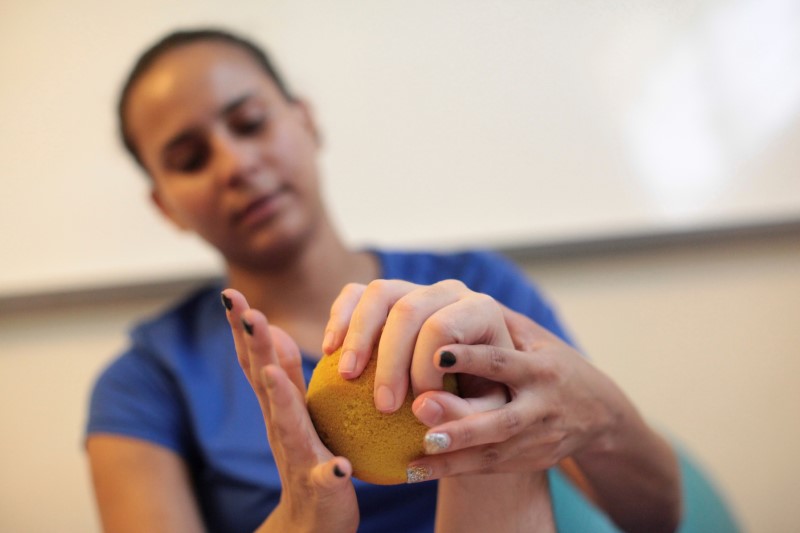By Robin Respaut
(Reuters) - The U.S. Congress should consider overhauling its system of benefits for disabled people in Puerto Rico, who get almost no government help, according to a new report by a task force addressing the island's economic crisis.
The report, released Tuesday, cited a December 9 Reuters investigation that detailed the scant support for island residents with severe mental and physical problems.
Most get nothing. Those who do get benefits receive an average of $74 a month - about a tenth of what the U.S. gives the disabled in its 50 states. Reuters also revealed wide disparities in support among U.S. territories.
Read the Special Report here: http://reut.rs/2hg0vDR
Sen. Orrin Hatch - a Republican from Utah who heads the bipartisan Congressional Task Force on Economic Growth in Puerto Rico - did not immediately respond to requests for comment Wednesday.
The task force recommended that Congress consider providing Puerto Rico and other U.S. territories the same Supplemental Security Income (SSI) benefits it grants to the states.
Four of five U.S. territories - Puerto Rico, Guam, American Samoa and the U.S. Virgin Islands - have been excluded from SSI since the program launched in the 1970s. The fifth territory, the Northern Mariana Islands, gets the same SSI benefits as a state, with an average payment of $560 monthly, in part because it negotiated its territory status at about the same time Congress enacted the SSI program.
Disabled Puerto Ricans, by contrast, receive much less through a nearly forgotten program administered by the Administration of Children and Families (ACF), a division of the U.S. Department of Health and Human Services. Nearly half of Puerto Rico’s disabled residents live in poverty - twice the rate of those in the 50 states.
The disabled in Guam receive an average of $164, and in the Virgin Islands, $176. Disabled people in American Samoa get nothing.
SSI offers disabled residents of U.S. states up to $733 each month and pays an average of $540.
As an alternative to giving the territories SSI benefits, the task force suggested Congress could increase benefits through ACF. Federal funding for the program has been capped since 1996 and is not indexed for inflation.
The panel also recommended that ACF publicly release up-to-date information about the benefits paid to disabled citizens of U.S. territories.
When Reuters first requested comment on benefits for the disabled in Puerto Rico, ACF declined to make anyone available because “no one is completely versed in all the details," said spokesman Pat Fisher.
On Wednesday, Fisher declined to comment on the task force recommendations. “We cannot offer an opinion on proposed policy," he said. "We only carry out approved policy.”
A 2014 study by the Government Accountability Office, the investigative arm of Congress, found that if Puerto Rico received SSI, eligibility would expand ten-fold from nearly 34,500 in 2011 to 354,000 people. The federal government’s payments to the island would skyrocket from $24 million to as much as $1.8 billion annually.
HEALTHCARE CRISIS
The task force also made recommendations about how to improve health care in Puerto Rico, which the group described as “a serious and urgent issue."
For decades, the U.S. offered lower payments to Puerto Rico under the federally sponsored Medicare and Medicaid insurance programs, which cover most people on the island. The Medicaid insurance program for the poor, for example, has had its funding capped by Washington for decades, spurring island officials to borrow heavily through municipal bonds.
That contributed to what is now the largest municipal debt crisis in U.S. history. An estimated one-third of Puerto Rico’s $70 billion of outstanding debt stems from bonds issued to shore up healthcare funding.
Reuters reported in October that Puerto Rico’s physicians are fleeing the island’s financially strapped healthcare system for high-paying and more stable jobs in the 50 states. The resulting shortage of doctors has exacerbated waits for appointments on the island to longer than 18 months in some specialties.
Read the Special Report here: http://reut.rs/2e4T00o
The most-cited reason for giving Puerto Rico unequal treatment in Medicaid and other programs is because Puerto Ricans do not pay federal income taxes. Some members of the task force believe that may warrant lower allocations for social welfare on the island, according to the report. Other members disagreed.
All members, however, agreed "more equitable treatment should still be considered," according to the report.
That would reduce the incentive for Puerto Rico residents to migrate to U.S. states, as they have in large numbers for decades, leaving behind a more vulnerable population.

The panel urged Congress to begin addressing the funding issues early next year, and suggested federal funding of the island’s Medicaid program be “more closely tied to the size and needs of the territory’s low-income population.”